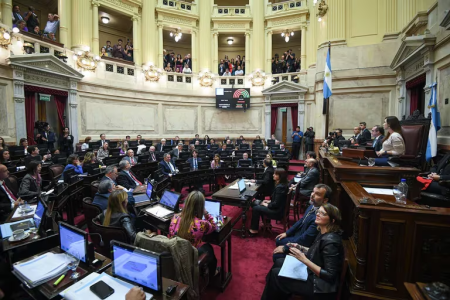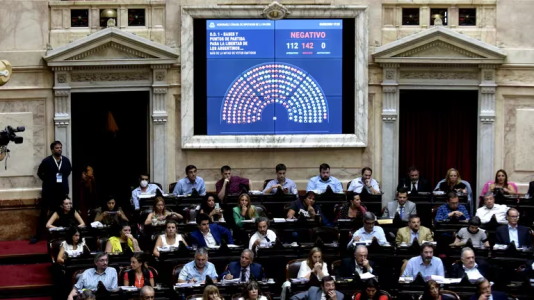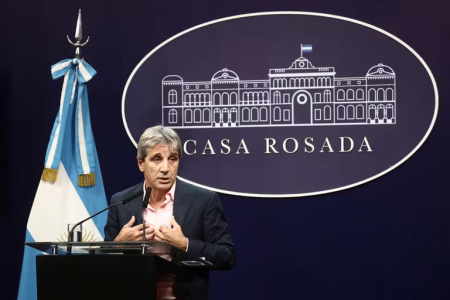All the Answers
Well-known member
Milei faces a crucial challenge in Deputies: toughness to defend the DNU and flexibility to negotiate the “Omnibus Law” - Infobae

Source:

Milei enfrenta un desafío crucial en Diputados: dureza para defender el DNU y flexibilidad para negociar la “Ley Ómnibus”
El Presidente tiene por delante una semana decisiva. El kirchnerismo avisó que buscará avanzar con el rechazo del decreto. Mientras los libertarios tratan de abrir canales de negociación con los gobernadores y los opositores no K por la “Ley Bases”. ¿Cuál es el límite que puso?
March 18, 2024
The President has a decisive week ahead of him. Kirchnerism warned that it will seek to move forward with the rejection of the decree. Meanwhile, libertarians are trying to open negotiation channels with the governors and non-K opponents for the “Bases Law.” What is the limit he set?
By Facundo Chaves

Javier Milei pointed out against the deputies who must deal with the DNU and the new Bases Law
Starting this Monday, Javier Milei will face a complex situation that will force him to combine toughness and flexibility to discuss with the same actors. Within hours of completing 100 days in office , the president will have to convince the same protagonists not to join the senators' rebellion against the DNU that deregulated the economy, and at the same time open a negotiation so that he can approve the new - and more modest - - version of the “Omnibus Law”. They are the two main measures promoted by the head of state and they did not pass the filter of Congress.
On the other side of the counter are the same interlocutors, who accumulate in even doses annoyance, resentment and an accumulation of unsatisfied political needs: they are the radical governors, those of the PRO and those of provincial groups - about 18 in total - and the deputies who do not They are part of the Kirchnerism or the left bench and they do not have an organic behavior with the political leaders of their districts.
The president spoke publicly on Friday, Saturday and Sunday and in the three reports he gave he confirmed the same message. That he is willing to defend the content of the decree of necessity and urgency that deregulated broad sectors of the economy and social life, and that the new project of “Bases and Starting Points for the Freedom of Argentines” is a proposal that is open to suggestions, with a single limit: “The zero deficit is not touched . ”
In the interview he had last night with Luis Majul, on LN+, the libertarian leader was exhaustive: “We are willing to listen to all discrepancies, as long as the zero deficit is not touched , which is not trivial.” It does not differ either in form or substance from what he had stated the day after the rejection by acclamation that he had in the Senate, regarding the drafts that they distributed of the Omnibus Law: “It is a guide, it has a format that is being negotiated, is under discussion. Always with the restrictions that there must be zero deficit .” It is the clause, the limit.

Voting of DNU 70/23 in the Senate of the Nation, Buenos Aires, Argentina on March 14, 2024. (Photos: Charly Diaz Azcue / Senate Communication)
Last week, the Government released the draft of the new and shorter “Omnibus Law” and another text that included the entire “fiscal chapter” that had been withdrawn when talks with the governors over co-participable funds bogged down in January. It is the reconfiguration of the project that Milei ordered to withdraw when it was being voted on in particular in the Deputies and which was the first setback it suffered in Congress. Then came the defeat of the Senate by the DNU, where the 33 members of the Kirchnerist bloc gained the support of 12 other legislators.
The president of the Unión por la Patria bench in the lower house, Germán Martínez, confirmed that his objective, starting this week, will be “in the shortest possible time to gather the votes necessary for the rejection” of the decree. If it were to happen, it would be the first time in history that the entire National Congress rejects a DNU from a sitting president and that decision is annulled, without effect.
As Martínez explained, his task will be focused on articulating with other political blocks to achieve a quorum of 129 deputies to start the session and, at the same time, so that that majority is willing to vote against. “We must try to generate the conditions to have a session with a regulatory quorum and a majority to reject it. Anxiety is not usually a good advisor, because you cannot form a majority and open the doors so that they end up ratifying it in the Chamber of Deputies.”
Milei reacted to this predictable advance of Kirchnerism to repeat in the lower house what happened in the Senate. “We do not believe that the DNU is down in the Deputies, but if it falls, those who bring down the DNU will suffer the same fate as the red names and their little faces from what happened in the Senate,” anticipated the president, who clarified that this situation, in his opinion, “is not a mess.” “The decisions are public, we are officials and public servants, so people know who the enemies of society are, who are in favor of privileges and who are in favor of freedom, we are going to expose them,” added the first leader.
Furthermore, he announced that if the DNU does not pass through the Chamber of Deputies "we are going to insist, we are not going to give up and we are going to continue trying" and he anticipated that he is willing to sign others again with the same content: "We can separate it in seven parts ,” he said. And he warned that if the decree were to be reversed and progress was not made with the sanction of the Omnibus Law, “the May Pact makes no sense.”
The flexibility side

Guillermo Francos met with Cristian Ritondo and PRO deputies
Opposition deputies who met at Casa Rosada with Minister Guillermo Francos, the Secretary of the Chief of Staff, José Rolandi, and the Secretary of the Interior, Lisandro Catalán, told Infobae that the first question they asked him about the content of the drafts that had reached their hands was whether it was going to be a closed text again and without the possibility of being discussed, modified or expanded. “If we send a draft it is because we have a spirit of dialogue and we are open to listening,” they say Milei's political minister responded.
Francos was with the PRO, with the UCR, and began a stealthy political craft to try to soften the tense spirits of several governors. That bellicosity could be traced in the votes rejecting the decree of necessity and urgency.
According to several sources who were following this trail, in the Chamber of Deputies they would be willing to move forward with the discussion of the “Omnibus Law” and the fiscal measures than with the DNU that comes from the Senate in a bad light. They speculate that it could be discussed after Easter in the same plenary session of commissions that issued a dispatch of the first version of the “Bases Law” - which was withdrawn by order of Milei - to have a debate in the venue around the 20th. of April.
Between the governors and the negotiation with the PRO, the provincials and the UCR - where Rodrigo De Loredo balances to keep the bloc together - will begin this week to analyze the sequence for the treatment, especially if they unify the draft of the Base Law and the fiscal measures that included the old chapter IV of the first version that, in December, the Government took to the Chamber of Deputies.
Regarding the project that contemplates economic measures, where Milei must have greater flexibility than ever, there is the issue of the Income Tax, which the Patagonian governors and legislators do not want to approve and those from the north do; and the issue of retirements, which radicalism has already warned that it is willing to force an urgent recomposition, so that beneficiaries do not have to wait until May or even June to have an increase that arises from a new retirement formula.
Will there be a DNU that will apply in advance the ad referendum formula that emerges from Congress? It is one of the versions that circulated insistently over the weekend and that Milei denied, although she did not rule it out definitively: “If we have to push it to the limit, we would do it.” Specifically, it would be applying an increase based on the adjustment for the Consumer Price Index, plus an extra 10% addition.
Project contrast

The session that rejected the original Omnibus Law project (photo Gustavo Gavotti)
The original “Omnibus Law” had a main body, with 386 articles, plus two annexes with 39 companies to be privatized and another three annexes with the Incentive Regime for Large Investments (65 articles), the reform of the Law for the Defense of Competition (77 articles) and the last with the changes in the Law of Non-Litigious Inheritance Processes (43 articles). A total regulatory plexus of 571 articles.
In its replacement, last week the Government sent deputies, senators and governors two drafts, the first that replaced the previous "Omnibus Law", which included 269 articles and two annexes with 12 "privatisable" companies, through three formats: sale, concession or mixed ownership. The second draft, which included the previous fiscal package, incorporated 119 articles. In total, 388 articles, 183 less than the shipment that ended up being withdrawn from Deputies.
In the very structure of the projects there are evident differences that demonstrate a moderation of reformist pretensions. In the first article, the Government withdrew the fiscal, security and tariff emergencies from the seven that it presented in the project that failed last month and also eliminated the articles and subsections explaining these exceptionalities.
In the new draft of the “Bases Law” that it sent to the opponents, the Government organized the texts and included within the articles Retirement Mobility, the Incentive Regime for Large Investments (RIGI) - which Milei considers key for his government - and changes in the Competition Defense Law.
Left out was the title that addressed Security issues - among them the control of social protest -, the one linked to Justice - from non-contentious divorce to changes in the intellectual property regime -, the Bioeconomy chapter, the reforms in the areas of Human Capital - in educational and cultural matters - and in those of Tourism and Environment, such as Transportation.
In the new text, eleven titles were included: State Reform, Current Contracts and Transactional Agreements; Debt consolidation; Mobility of pension benefits; Promotion of registered employment; economic deregulation; Defense of competition; Energy; Incentive regime for large investments; and Final provisions.

The day Minister Caputo announced that he was withdrawing the "Tax Chapter" from the "Bases Law" project
The reborn Fiscal Chapter
Revisiting and expanding the old wording of the original project, which had 664 articles, the project recovered and expanded the content of the “fiscal chapter” that Minister Luis “Toto” Caputo withdrew due to pressure from the governors. In the new text, which the Deputies are still defining whether they treat it together or separately, included 119 articles and eleven other titles.This is the Regime for Exceptional Regularization of Tax, Customs and Social Security Obligations; the Asset Regularization Regime; the Personal Property Tax; Internal Taxes; Tax on the Transfer of Real Estate of Natural Persons and Undivided Estates; Income Tax; Simplified Regime for Small Taxpayers; Consumer Tax Transparency Regime; and Other Fiscal Measures.
Although President Milei vehemently defended the approval of the “Omnibus Law,” he reinforced the pressure for Congress to endorse the fiscal package. The second project includes measures that will allow it to maintain the zero deficit. A discussion between ideas and things.

